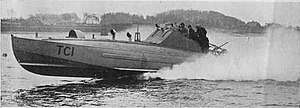Uskok-class torpedo boat
The Uskok class or Četnik class was a class of motor torpedo boats built for the Royal Yugoslav Navy (Serbo-Croatian: Jugoslavenska kraljevska ratna mornarica; JKRM) during the 1920s. Two boats were built by the Thornycroft Company based on their existing class of 17-metre-long (55 ft) Coastal Motor Boats, with British-designed 456-millimetre (18 in) torpedoes as their main armament.
 TČ 1 in Royal Yugoslav Navy service | |
| Class overview | |
|---|---|
| Builders: | John I. Thornycroft & Company, United Kingdom |
| Operators: | |
| Built: | 1926–27 |
| In commission: | 1927–43 |
| Completed: | 2 |
| Lost: | 1 |
| Retired: | 1 |
| General characteristics | |
| Displacement: | 15 tonnes (15 long tons) (standard) |
| Length: | 16.77 m (55 ft) |
| Beam: | 3.35 m (11 ft) |
| Draught: | 1.30 m (4 ft 3 in) |
| Installed power: | 750 hp (560 kW) |
| Propulsion: |
|
| Speed: | 37 knots (69 km/h; 43 mph) |
| Complement: | 5 |
| Armament: |
|
When Yugoslavia entered World War II due to the German-led Axis invasion of Yugoslavia in April 1941, both boats were captured by Italian forces. They were commissioned in the Royal Italian Navy, although their age and condition meant they were only used for patrolling and second-line duties. The first boat sank near Mljet in 1942 when its hull failed, and the second one was discarded in September 1943 and broken up after the war.
Description and construction
The class was based John I. Thornycroft & Company's existing class of 17-metre-long (55 ft) Coastal Motor Boats.[1] Some sources refer to them as the Uskok class,[2] while others call them the Četnik class.[3]
They measured 16.77 metres (55 ft) in length, with a beam of 3.35 m (11 ft) and a normal draught of 1.3 m (4 ft 3 in). Their standard displacement was 15 tonnes (14.8 long tons), and they had a crew of five. They used two Thornycroft petrol engines driving two propeller shafts. The engines were rated at 750 horsepower (560 kW), and were designed to reach a top speed of 37 knots (69 km/h; 43 mph), although a speed of 40 knots (74 km/h; 46 mph) was achieved during sea trials in 1927. They carried 1.6 tonnes (1.6 long tons) of fuel. They were equipped with two 456 mm (18 in) torpedo tubes, two Lewis machine guns and up to four depth charges. An auxiliary engine of unknown rating was installed for cruising.[3][4]
Both boats were laid down on 15 September 1926[5] and launched in May 1927.[6][7] They were commissioned into the Royal Yugoslav Navy (Serbo-Croatian: Jugoslavenska kraljevska ratna mornarica; JKRM) as TČ 1 and TČ 2, later being renamed Uskok and Četnik.[3][4] Initial exercises with the boats were delayed to await the return of their commanding officer from training in the United Kingdom. There were also some concerns that the Mediterranean sun would warp their hulls, and precautions were put in place to cope with this should it occur.[8]
Service history
At the start of the German-led Axis invasion of Yugoslavia, Uskok, Četnik and the eight Orjen-class boats were part of the JKRM's 2nd Torpedo Division in Šibenik.[9] They were soon captured by Italian forces and commissioned in the Regia Marina (Royal Navy) as MAS 1 D and MAS 2 D, with "MAS" standing for Motoscafo Armato Silurante (English: Torpedo Armed Motorboat) and the prefix D denoting they were captured in Dalmatia. Due to their age and poor condition, they were only used for patrol and second-line duties. MAS 1 D was lost on 19 April 1942 near the island of Mljet after the rivets in her hull plating failed, and she sprang a leak and sank. MAS 2 D was redesignated MS 47 in July 1942, before being stricken from the MTB list on 1 September 1943 and declassed as ME 43. After the war she was found in Taranto in a "very bad shape", and she was eventually broken up in the early 1950s.[3][4][10]
Footnotes
- Chesneau 1980, p. 359.
- Vego 1982, p. 349.
- Chesneau 1980, pp. 358–359.
- Fraccaroli 1974, p. 179.
- Jarman 1997a, p. 780.
- Chesneau 1980, p. 358.
- Jarman 1997b, p. 61.
- Jarman 1997b, pp. 61–62.
- Niehorster 2016.
- Brescia 2012, p. 157.
References
- Brescia, Maurizio (2012). Mussolini's Navy. Barnsley, South Yorkshire: Seaforth Publishing. ISBN 978-1-59114-544-8.CS1 maint: ref=harv (link)
- Chesneau, Roger, ed. (1980). Conway's All The World's Fighting Ships, 1922–1946. London, England: Conway Maritime Press. ISBN 978-0-85177-146-5.CS1 maint: ref=harv (link)
- Fraccaroli, Aldo (1974). Italian Warships of World War II. London, England: Ian Allan Publishing. OCLC 834485650.CS1 maint: ref=harv (link)
- Jarman, Robert L., ed. (1997a). Yugoslavia Political Diaries 1918–1965. 1. Slough, Berkshire: Archives Edition. ISBN 978-1-85207-950-5.CS1 maint: ref=harv (link)
- Jarman, Robert L., ed. (1997b). Yugoslavia Political Diaries 1918–1965. 2. Slough, Berkshire: Archives Edition. ISBN 978-1-85207-950-5.CS1 maint: ref=harv (link)
- Niehorster, Leo (2016). "Balkan Operations Order of Battle Royal Yugoslavian Navy 6th April 1941". Leo Niehorster. Retrieved 10 August 2016.CS1 maint: ref=harv (link)
- Vego, Milan (1982). "The Yugoslav Navy 1918–1941". Warship International. Toledo, Ohio: International Naval Research Organisation. XIX (4): 342–361. ISSN 0043-0374.CS1 maint: ref=harv (link)